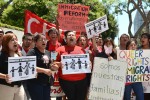The audience cheered for Victor Narro as he escaped from chains bolted around his hands and neck, representing the struggles undocumented individuals endure.
“I want to make (the chains) analogous to what is happening to undocumented families now,” said Narro, UCLA Labor Center project director and Chicana/o studies professor.
Narro’s escape was part of a 24-hour vigil that started on Wednesday at noon in front of the Federal Building in downtown Los Angeles, where participants urged senators to pass an immigration bill that would overhaul what they call a “broken” immigration system.
On Thursday, the U.S. Senate passed a comprehensive, bipartisan immigration bill in a 68-32 vote. The bill outlines a 13-year path to citizenship for undocumented immigrants and increases the number of work visas for foreign skilled workers, including graduating international students who want to stay in the United States to work.
More than 40 people participated in the event, hosted by about 30 social activist groups including the UCLA Labor Center and Improving Dreams, Equality, Access and Success, a UCLA student activist group for undocumented students.
The participants cheered and chanted loudly when the results of the vote were announced on a projected screen for everyone to watch, including reporters from local news outlets.
The proposal also includes an expedited citizenship process for individuals who arrived as children and meet certain criteria, such as attending college for two years and having no criminal record.
At the vigil, participants danced, chanted and listened to testimonies of undocumented individuals going through the current immigration process. One of the chants throughout the event was “Sí, se puede,” or “Yes, we can.”
Many of the demonstrators’ stories involved relatives waiting to receive a green card, which gives U.S. immigrants permanent resident status. Some said they have been waiting for up to five years to receive green cards or work visas.
Others told stories about relatives who were deported because an employer revealed their illegal status to the government or for minor crimes, such as jaywalking.
Kevin Lee, a UCLA alumnus and an organizer of the event, said he overstayed his visa with his family when he was 9 years old.
Lee said he knew he was undocumented since he was very young and that he remembers his mother telling him to hide his undocumented status from even his best friends for fear of being caught.
“We’re not criminals,” Lee said. “We want to be part of society and contribute to this country.”
The immigration bill would offer Lee and his mother a path to be legally allowed to stay in the United States, Lee said.
Seth Ronquillo, co-chair of IDEAS and and an undocumented fourth-year film student, said his entire family is undocumented and cannot fully support him because the current immigration system does not offer them citizenship because they reside in the country illegally.
Currently, undocumented individuals in the U.S. have to leave and return to their native country in order to earn legal status, according to the United States Citizenship and Immigration Services website.
Nathanel Lowe, an organizer who graduated from UCLA with a master’s degree in regional planning, said the process is inconvenient and separates families. The immigration bill would help stop that, he added.
The bill would also make revisions to the visa system that would reduce the wait for immigrants to legally live and work in the United States. Citizenship will also allow undocumented individuals to receive government support, Narro said.
But, members of the undocumented community said they are concerned that the increased border security included in the bill would send an antagonistic message to future immigrants.
The bill included an amendment that would spend $46 billion dollars to secure the U.S.-Mexico border over the next 10 years, placing a pause on applications for legal status until the Department of Homeland Security puts in place more enforcement personnel and fences across the border.
The immigration bill now has to pass the House of Representatives, but negotiations are expected to be more heated because Republicans hold the majority in the House, Narro said.
House Republicans believe there is not enough emphasis on securing the border, Narro said.
But the Senate bill may not even reach the House of Representatives. Recently, the House speaker, John Boehner, said he will not let the Senate bill come to the floor and the House will only produce its own version of the immigration bill.
Democrats hope to pressure the House to consider the bill over the summer and fall, The New York Times reported.
“These are the challenges that lie ahead,” Narro said. “This is just the nature of the political landscape now.”
